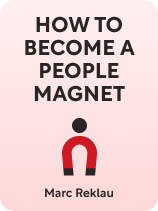

This article is an excerpt from the Shortform book guide to "How to Become a People Magnet" by Marc Reklau. Shortform has the world's best summaries and analyses of books you should be reading.
Like this article? Sign up for a free trial here.
How effective are you at maintaining harmony in your relationships? Do you get into squabbles or hostile situations more than you’d like to?
Healthy relationships are crucial for our well-being, but it’s not always easy. In How to Become a People Magnet, Marc Reklau lays out three key strategies to help you navigate potential disagreements and keep your relationships moving in a positive direction.
Continue reading to get Reklau’s three-part advice for how to avoid conflict in relationships.
Avoiding Conflict in Relationships
Reklau explains that, to maintain good relationships with others, you should try to avoid any kind of conflict. Conflict is a lose-lose situation—even if you get what you want, you still make the other person feel bad and damage your relationship. He has three pieces of advice for how to avoid conflict in relationships: don’t take offense easily, don’t try to change others, and make sure any criticism you give is constructive.
(Shortform note: Some authors disagree with Reklau, suggesting that there are upsides to conflict. In Conflicted, columnist Ian Leslie claims that arguments can provide unique opportunities for insight and new ideas if you approach them in a productive, rational way. This is because arguments often provide new perspectives—you might have to defend your own beliefs from an angle you hadn’t previously considered or reckon with a new argument for something you disagree with. Leslie suggests that, when done correctly, arguing can strengthen connections by teaching people to respect each other’s opinions.)
1) Don’t Take Offense
To avoid conflict, Reklau suggests you don’t take offense to what other people say and do. When you treat their words and actions as personal attacks, you’re more likely to get hurt and become confrontational. Instead of assuming people are trying to judge or insult you, ask them what they mean. If they’re offering constructive criticism, you can learn a lot by listening and being open to it. And if someone is judging or insulting you, tell yourself that it’s their problem and that getting into an argument won’t help anything. You should remain positive even if someone is being mean and be willing to forgive them—getting mad and holding grudges wastes time and energy.
For example, Tim tells Amy that she’s “a very tough person.” Instead of assuming Tim is calling her mean and harsh, Amy asks him what he means. Tim says he meant that she’s determined and strong even during hard times. By not taking offense right away to Tim’s comment, Amy avoided potential conflict.
(Shortform note: If you’re struggling to not take offense to what others say and do, you might have to look inside yourself for a deeper cause. Mental health experts explain that taking things personally often stems from deeper negative feelings, like a specific insecurity or fear of being judged. These deeper feelings can then be triggered by specific comments or words, causing you to feel hurt and get defensive to protect yourself. In other words, you assume others are trying to hurt you, so you take offense. To determine if there’s a deeper cause leading you to take things personally, consider how you interpreted whatever bothered you, other ways you could have interpreted it, and how your interpretation touched on an emotional sore spot.)
2) Don’t Try to Change Others
You can also avoid conflict by not trying to change the opinions and behaviors of others, explains Reklau. People are usually set in their ways and tend to get more stubborn and defensive when challenged. Because of this, trying to change others is usually an unproductive source of tension. Reklau recommends you avoid the urge to change others by focusing on people’s strengths instead of their faults. When you pay more attention to what you like about someone, you’ll want to change them less.
(Shortform note: In some instances, changing other people can be a mutually positive experience that doesn’t create conflict—such as helping someone improve in an area of their life or trying to alter the behaviors responsible for relationship struggles. In these instances, psychologists suggest you approach whoever you want to help from a place of love and care, and only proceed so long as they seem onboard. Otherwise, you’ll run into the unproductive defensiveness Reklau describes.)
3) Give Constructive Criticism
Reklau recommends that you avoid criticizing others as much as possible since you can’t change others and should avoid potential conflicts. But if you do need to offer criticism, he suggests framing it positively and constructively. This makes people feel less judged or personally attacked, leading to fewer conflicts. For example, you offer praise before and after your criticism to soften it with positivity, and ask the other person for potential solutions so they feel like you’re working together to constructively address the problem.
(Shortform note: The authors of The One Minute Manager note that you can also take steps before offering feedback to help keep any future criticism positive and constructive. They recommend you set clear expectations and standards well in advance of any criticism. Having clear standards means your feedback will be clearer and less likely to surprise people. This lowers the chances of any misunderstandings or unpleasant surprises that might lead to conflict.)

———End of Preview———
Like what you just read? Read the rest of the world's best book summary and analysis of Marc Reklau's "How to Become a People Magnet" at Shortform.
Here's what you'll find in our full How to Become a People Magnet summary:
- Why charisma is a learned skill, not something you’re born with
- How to make a first impression that’s unforgettable
- How to persuade people to do what you want






